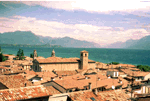

|
Community Networking Conference, page 3
Amsterdam DigiStaat (Digital City) began in 1994 with subsidies from the city and national government, but since 1995, it has been self-supporting. It's a nonprofit business with 50,000 registered users, 20 employees, and a budget of $1 million per year. It still likes the city metaphor, (post office, cafe, and so on, but Joost Flint claims it is not place based.) Seventy-eight percent of the users are from outside the city. Many of its communities are virtual: books, movie arts, travel, government. Every user has a unique computer-generated "dodo" or face, which can be replaced with a photo. When you become a resident you get free email, can take part in chats, can build home pages for free and can take part in the multiuser environment and vote. Besides a number of innovative local projects, it has been in discussions with the U.S. State Department about information and discussions on transatlantic ties.
Heikki Korpinen of Freenet Finland and Veronique Klerk of France spoke about projects that were not confined to one locale but included educators all over Finland and a variety of citizen groups interested in social justice in France. Klerk is planning a conference in a small town called Parthenay where there is a special effort to introduce the townspeople to new technologies as well as a community network for more civic participation. The conference will take place at the end of September and may be the next meeting of the newly formed European Alliance of Community Networks. Si ca vous interesse, ecrivez Klerk: maisongrenelle@globenet.org.
Leda Guidi, a librarian by training, is project manager for IPERBOLE, Bologna's civic network. Bologna is an industrial town of about 900,000 that has long had a Communist municipal government. They have set up the CN to encourage two-way communications between citizens and city officials. Their goals include experimenting with new, easy-to-use interfaces, cutting red tape for city-related issues, and universal service. "Acquiring the habit of using communication for civil and democratic aims can be the best way to fight any possible telematic oligotechnocracy and to enlarge the critical mass." So far they have over 9000 users with 63 schools and 130 municipal offices providing information. A commercial firm has challenged IPERBOLE in court saying a private firm should provide these services, and the case is pending while the network continues to operate and grow.
In a conference filled with dynamic speakers, Gigi Tagliapietra stood
out. He is a systems integrator, former city council member, and longtime inhabitant of Desenzano del
Garda, where he established Onde, a learning community. Onde means "wave", and in this lakeside town the
five waves are information, awareness, education, usage, and the civic network. He hopes to make the
town "an engine for change." After the conference ended, I took the train to visit Tagliapietra.
Overview | Digital Photography Course | Science with eMates | Spotlight Essay | Book Review | Community Networking | INET '97 | News Page One | Find It | Apple Computer, Inc. | Contact Us | Help
|
